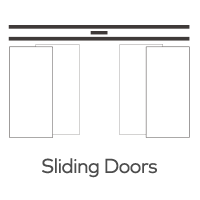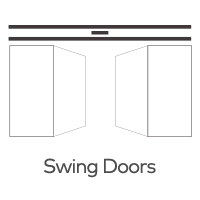Are there any specific installation requirements for glass door sensors?
Glass door sensors are a valuable addition to any security system, providing enhanced protection and peace of mind for both residential and commercial properties. These sensors are designed to detect unauthorized access through glass doors, alerting homeowners or business owners of potential breaches. However, the proper installation of glass door sensors is crucial to ensure their optimal functionality and effectiveness. In this article, we will explore the specific installation requirements for glass door sensors and the factors to consider when implementing these devices.

1. Sensor Placement
To maximize the effectiveness of glass door sensors, proper placement is key. These sensors should be strategically positioned to cover the entire surface area of the glass door. The ideal location is on the frame or the adjacent wall, facing the glass surface. The sensor's detection range must be able to monitor the entire door area, ensuring no blind spots that could be exploited by intruders.
2. Glass Type Compatibility
Different glass door sensors are designed for specific types of glass. It is essential to ensure that the sensor you choose is compatible with the type of glass used in your door. Most sensors work well with standard single-pane glass, but if you have double-pane or tempered glass doors, you may need specialized sensors designed for these materials. Failure to use the appropriate sensor could result in inaccurate readings or diminished performance.
3. Power Supply
Glass door sensors are available in both wired and wireless configurations. Wired sensors draw power from the main security system, while wireless sensors rely on batteries. If you opt for a wired sensor, you must ensure that there is a power source nearby to connect it properly. On the other hand, wireless sensors offer more flexibility in terms of installation, but it's crucial to keep track of battery life and replace batteries as needed.
4. Calibration and Sensitivity
Calibrating glass door sensors correctly is essential to avoid false alarms or missed detections. The sensitivity settings must be adjusted appropriately to detect the subtle vibrations caused by tampering attempts or forced entry attempts. Factors such as environmental conditions, air conditioning, or vibrations from nearby machinery can influence sensor sensitivity, so it is essential to take these into account during calibration.
5. Avoiding Obstructions
To ensure accurate readings and reliable operation, it's essential to avoid placing obstructions near the sensor. Objects like curtains, plants, or furniture should not obstruct the sensor's line of sight to the glass surface. Obstructions could prevent the sensor from detecting movements or vibrations, rendering it ineffective.
6. Professional Installation
While some glass door sensors can be installed by homeowners with basic DIY skills, it is advisable to have these security devices installed by professionals. Certified technicians can ensure that the sensors are optimally placed and calibrated for the specific requirements of your property. Professional installation also minimizes the risk of errors or damage during the setup process.
Conclusion
Glass door sensors play a vital role in enhancing the security of both residential and commercial properties. To ensure their optimal functionality, it is crucial to adhere to specific installation requirements. From proper sensor placement and compatibility with the type of glass to calibration, sensitivity adjustments, and avoidance of obstructions, each step in the installation process contributes to the effectiveness of these security devices. By following these guidelines, property owners can ensure that their glass door sensors perform optimally and provide the protection and peace of mind they seek.







